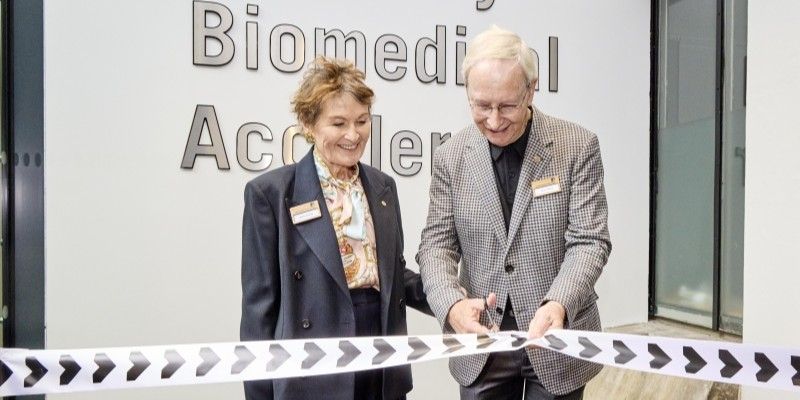A state-of-the-art research facility providing opportunities for new and bold discoveries through multidisciplinary health research has opened at the University of Leeds.
The Cheney Biomedical Accelerator brings together the University's advanced Bioimaging and flow cytometry laboratories, which include a range of different types of high-resolution microscopes and imaging equipment.
It will also include the highly specialised microscopy equipment funded by the £1.1. million investment from the Wolfson Foundation, collectively making it one of the few university facilities in the UK to bring together this scale of advanced imaging technologies in one setting.
It was officially opened by donors Peter and Susan Cheney on 26 September, as part of their wider vision to support translational science at the University. The Cheneys' donation is also funding a bespoke PhD scholarship programme, and a series of workshops and funding calls designed to support interdisciplinary research.
The aim is to enable researchers across specialities to collaborate on research addressing global health challenges such as cancer, heart disease, neurogenerative diseases, antibiotic resistance and infectious diseases.

Peter Cheney graduated from Leeds in 1969 with a degree in Bacteriology and Biochemistry and has been a long-term supporter of the University.
He said: "We're so proud of what the team has achieved. They've done a brilliant job transforming the space into something that will be a real asset to the University - not just now, but for years to come.
It's exciting to see how this initiative is already leveraging further investment, and we're delighted to have been able to play a part in it. This really is only the beginning."
Nick Plant, Pro-Vice Chancellor: Research and Innovation at the University of Leeds, said: "The Cheneys' generous donation, and the opening of the Cheney Biomedical Accelerator, marks a significant investment in the University's research infrastructure and its people.
"By bringing together support for postgraduate researchers and interdisciplinary research projects, advanced imaging technologies, and now a dedicated space for the exploration of collaborative new ideas, the facility will strengthen Leeds' position as a leader in biomedical research."
Leading microscopy research
The high-tech equipment housed at the Cheney Biomedical Accelerator supports in-situ biology, where researchers can explore disease at the scale of individual cell structures and observe how those structures respond to both disease and treatments. The approach is already being used at Leeds to investigate the early stages of diseases including Alzheimer's, cardiac conditions and viral infections.
Working with industry
A key aim of the Cheney Biomedical Accelerator to support future collaborations with industry, particularly where new technologies and approaches could help address unmet clinical needs.
The Accelerator builds on the strength of biological research taking place in multi-disciplinary centres across the University. The Astbury Centre for Structural Biology brings together hundreds of researchers from across the University to understand the molecular basis of life.
Our aim is to better understand disease, and discover new ways to treat it.
It joins a strong research and innovation infrastructure at the University and further afield.
Nexus, the University's innovation hub, helps innovators access research, talent and facilities across the University and beyond.
And the University's clinical research centres bring together academic expertise and industry and healthcare partners, including Cancer Research UK RadNet Leeds; the NIHR Leeds Biomedical Research Centre, and the NIHR Leeds Clinical Research Facility.
Professor Neil Ranson, Co-Director of the Cheney Biomedical Accelerator and Director of the University's Astbury Centre for Structural Molecular Biology at the University of Leeds, said:
"The Cheney Biomedical Accelerator builds on Leeds' strong foundation of excellence in biological discovery research. Now, with this state-of-the-art equipment - and the opportunity to work collaboratively with clinicians - we can study disease at the molecular level inside cells and tissues, in ways that were previously impossible. Our aim is to better understand disease, and discover new ways to treat it."
Professor Francesco Del Galdo, Co-Director of the Cheney Biomedical Accelerator and S Cheney Professor of Experimental Medicine in the University's School of Medicine said: "This isn't just a building; it's a space that is designed to spark ideas. By bringing people together across disciplines, we're creating a community of researchers who can think differently, start from the right questions, and build on the latest technologies to tackle unmet clinical needs of our society."






